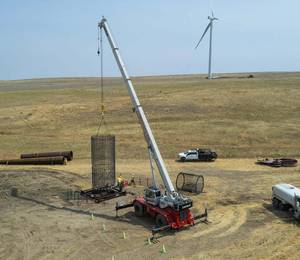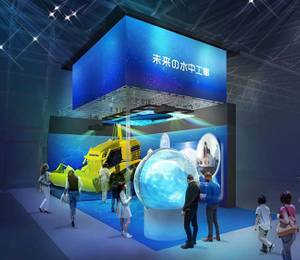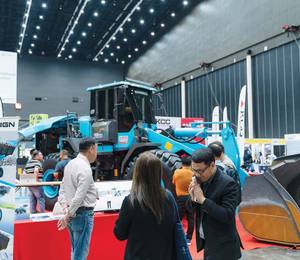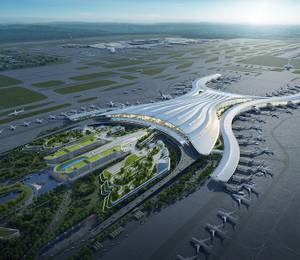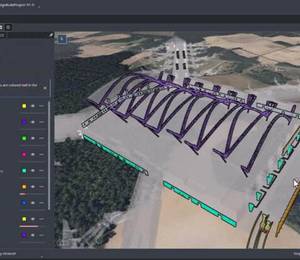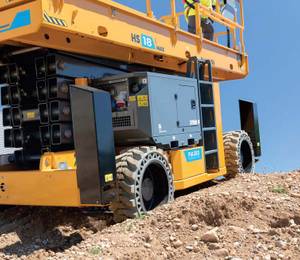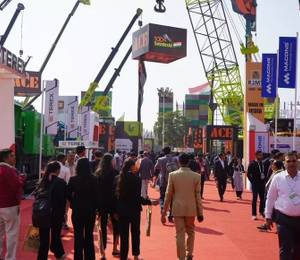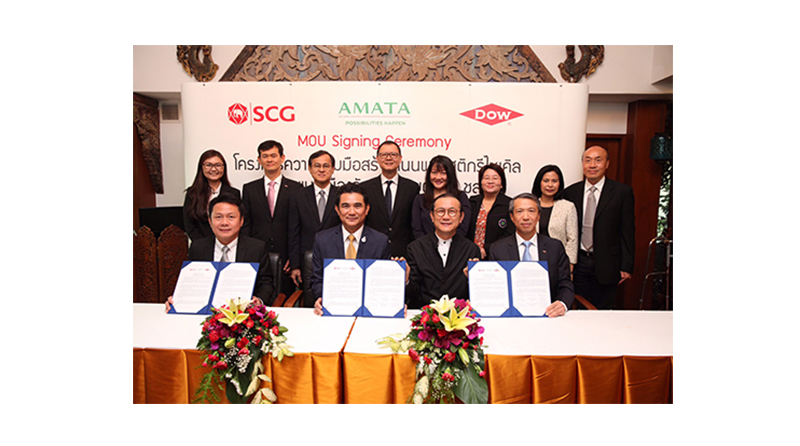Amata Corporation Public Company Limited, Chemicals Business of Siam Cement Group (SCG) and Dow Thailand Group have recently signed a Memorandum of Understanding (MOU) to develop the first recycled plastic roads in industrial estate in Thailand.
The roads will be developed for Amata Smart City Chonburi, a pilot project that creates new value for plastic waste and advances a circular economy. The project aims to offer opportunities to increase the durability of asphalt roads while reducing the amount of plastic waste in the industrial estate and the environment. It is said that Amata Smart City Chonburi will have the first recycled plastic roads in Thailand.
At present, there is reportedly more than 1.5 mil t of mismanaged plastic waste in Thailand. Some of that waste ends up as marine debris and eventually as micro plastic in the oceans, negatively impacting the environment. The partnership between the three companies intends to serve as a model of how organisations can collaborate to reduce the amount of plastic waste in the environment, advance a circular economy and create value for plastic waste. A total of 1.5 t of recycled plastics in Amata Industrial Estate will be converted into roads that stretch 2,600 sq m, equivalent to approximately 100,000 plastic bags. The construction of the plastic asphalt road is expected to complete by 2019.
According to the three partners, Chulalongkorn University recently conducted a trial comparing asphalt roads made of recycled plastics with standard asphalt roads. The research stated that the asphalt plastic roads are 15-33% more durable and lead to 6% higher skid resistance.
Vikrom Kromadit, founder and CEO of Amata Corporation PCL said, “The designated partnership between Amata, SCG and Dow is aimed at creating a sustainable business environment by turning recycled plastics into asphalt roads at Amata City Chonburi as Thailand’s first Smart City. Apart from its durability, the plastic roads also mean a valuable solution for plastic waste and a chance to enhance circular economy, which results in reduction of environmental impact for Thailand.
“Plastic road development is part of the Smart City Project to create smart environment in alignment with the government’s policy in developing smart city in the Eastern Economic Corridor (EEC). We are proud to announce that this project will launch the first recycled plastic road in industrial estate in Thailand, which turns practice into reality and we continue to expand it to other area in the future.”
Cholanat Yanaranop, president of Chemicals Business, SCG Chemicals added, “The circular economy is a way towards sustainable development that focuses on optimising resources, therefore maximising its utilisation to their fullest potential efficiently. To make the circular economy a reality, the key is collaborations of all sectors involving the government, private sector and civil society. This collaboration between Amata - SCG - Dow is the beginning of establishing strong partners who share the same vision. SCG is committed to becoming a driving force of the project and further promoting cooperative networks to other sectors in the future, which will be other sustainable solutions of plastic waste reduction.”
“Dow previously succeeded in developing more than 40 km of asphalt roads containing recycled plastics in India and Indonesia, resulting in sustainable solutions to plastic waste,” explained Chatchai Luanpolcharoenchai, president of Dow Thailand Group. “In addition to creating sustainable solutions, plastic roads have more stability, durability and impermeability. Close collaboration between the three partners will lead to new innovation for recycle plastics that provides tangible benefits to communities in Thailand.”
